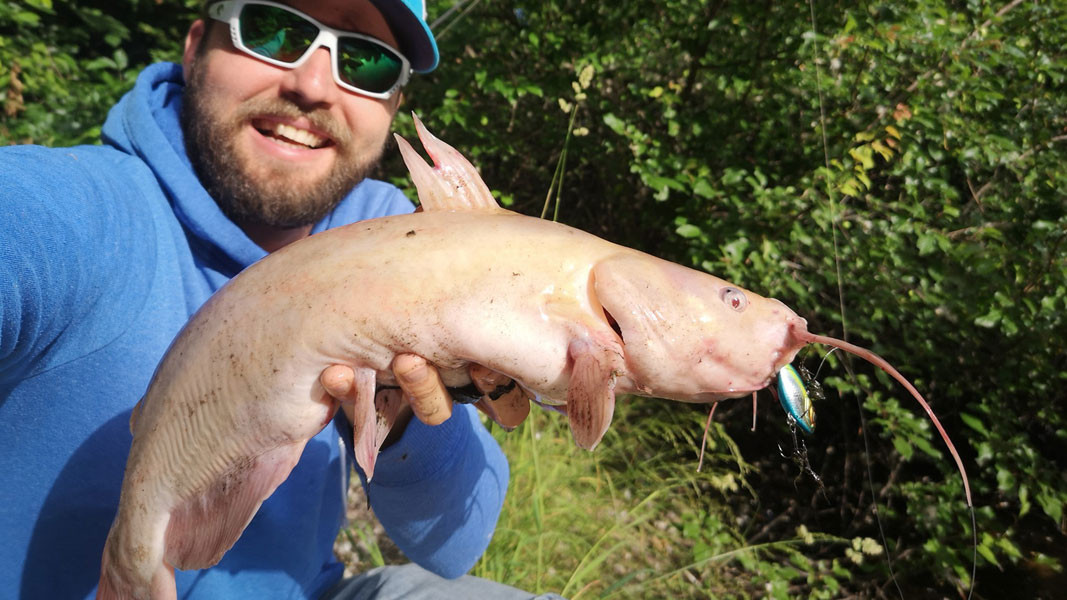Is it possible to catch a fish downtown Sofia? The vloggers from Twitch Fishing answer this question. The young anglers practice street-fishing, also known as fishing in urban environment, which is not popular in Bulgaria, unlike Romania, where a series of street-fishing competitions are held, or France for instance, where this type of fishing has been a popular hobby and entertainment in the past 10 to 15 years.
Once, we decided to catch a trout in one of the rivers which flow through the center of Bulgaria’s capital Sofia, Mihail Petrov who founded the video channel recalls. We learnt from not so reliable sources that the fish goes down the river. And we caught a large trout with the first attempt. We were grabbed by this type of fishing and now we practice street fishing often and try to catch fish in many new places.

There are several lakes and ponds in Sofia. Seven rivers rising from the nearby Vitosha Mountain also flow through Bulgaria’s capital. One of them flows under the National Palace of Culture downtown Sofia. And yes, there is trout in this river, too.
People are very surprised when they see a trout in the highly polluted canals in Sofia. The fish likes clean and fresh water, but apparently it got used to surviving in dirty water, because many canals with polluted water flow into the rivers that run across Sofia. I would not recommend people to eat fish, if they catch it in Sofia, because it feeds on waste. You can also catch other predatory fish such as pike and perch, but there is also tench, common rudd and common barbell. There is great variety of fish species in Sofia, yet they are rarely encountered, Mihail points out.
According to experts, this is due to the reduction of the fish population in the Bulgarian dams and rivers. Fishing in this country has been random in the past 20 to 30 years and the use of fishing nets and electric devices led fishing to the current poor condition. Fortunately, in the past 4 to 5 years the Catch and Release practice has been gaining popularity in Bulgaria. Is this a new trend?
Yes, we are trying to introduce this trend, Mihail Petrov replies. Only 5% to 10% of the anglers in Bulgaria release the fish into the water after they catch it. 50% to 60% of the fishers who use artificial baits release almost all the fish into the water. However, ordinary angler and people who fish with natural bait take the fish home. It is quite wrong to think: Someone else will catch the fish if I do not take it. If all people thought this way we would have nothing to catch. It is not about catching a free meal, but going out in the nature to relax from your busy daily routine. That is why the motto of the Twitch Fishing channel is Do Not Eat Your Dreams!, because each angler dreams of catching a big fish, but it will not grow big if we eat all the fish we catch.
Many people wonder what the thrill of this type of fishing is. It feels great, because you catch a fish in a place where others think there are not even frogs. The biggest fish I caught when I was street fishing was a 2 kilogram pike and 1.5 kilogram trout which were over 50 centimeters long.
 This is regarded as a very big achievement, taking into consideration where this fish was caught. Two weeks ago I caught an albino sheatfish-white colored with pink eyes. It weighed around 2 kilos. This was the first time I saw albino sheatfish and in fact this was the biggest surprise when I was street fishing.
This is regarded as a very big achievement, taking into consideration where this fish was caught. Two weeks ago I caught an albino sheatfish-white colored with pink eyes. It weighed around 2 kilos. This was the first time I saw albino sheatfish and in fact this was the biggest surprise when I was street fishing.

It requires a lot of perseverance. You should not be shy to walk with your fishing rod in an urban environment. I recommend this type of fishing to young people who constantly use computers or are engaged in other types of harmful activities. This is great pleasure and keeps people active. Do not eat your dreams, so we will have more fish to catch in the future.
Photos: private library
English version: Kostadin Atanasov
The 33rd Bulgarian polar expedition is heading to Antarctica to continue its scientific research in cooperation with scientists from different countries. For the first time, travelers from two Balkan countries - Greece and Montenegro, as well as from..
The program of the Orthodox Book Week offers meetings with authors, publishers and translators of Orthodox books from the last few years. The event is held until November 10 at the ''St. Procopius of Varna'' Church, with meetings taking place every..
The "Kabiyuk" horse breeding farm in the village of Konyovets is the oldest stud farm in Bulgaria, founded in 1864 by Midhat Pasha, the governor of the vilayet of Ruse, to produce horses for the Turkish army. The farm existed until the Russo-Turkish War..
Modernizing critical thinking skills, fact-checking skills and media literacy are essential for society, especially for young people in Bulgaria - the..
"You say you are Bulgarian, but you do not know Bulgarian" – this reproach from officials in Bulgaria has been faced by quite a few by our compatriots..
The survival of millions of people around the world, living in conditions of war, hunger, disease and immense despair, is at stake every day. We often..

+359 2 9336 661
